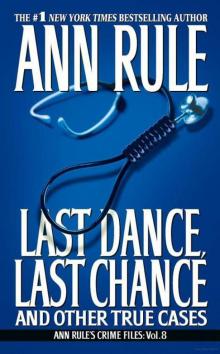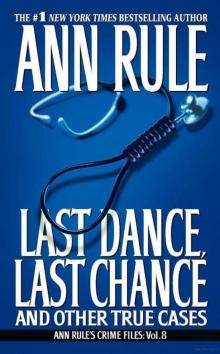Smoke, Mirrors, and Murder and Other True Cases Read online
Page 9
“I knew he’d look for a way to get under my skin, and hurt me the most,” Sue said, almost to herself. “And I realize he’s angry enough to just do away with me—but I never dreamed that he would want the kids dead!”
“I want you to find your kids, tell them to pack what they need for a couple of days, and leave here,” Steiger said. “Get a hotel—a motel. Stay with friends or relatives. But you have to get away from your house.”
Sue was stunned. She still couldn’t comprehend that Bill would hurt their children. She simply could not visualize that Bill would do anything to either Jenny or Scott. She wondered if Cloyd Steiger had gotten some kind of garbled message.
He shook his head. “All three of you,” he repeated. “You can’t tell anyone but your sister. Don’t tell your children. Make up some excuse about why you have to get out of here, but we can’t take a chance that your kids might tell someone.”
Steiger told Sue that he was working with someone who had instigated an investigation into a murder-for-hire plot, but he couldn’t tell her who it was. He had only found out himself hours before, and although they were working as fast as they could, his team didn’t know all the facts yet. They knew of a couple of people who might be involved, but there was the possibility that the person who wanted her family dead had hired additional people.
As soon as the Seattle detective left her house, Sue called her daughter. Jenny was out with friends, and when Sue reached her and told her that it would be better if she didn’t come home for a few days, that it would be a good idea if she stayed at her best friend’s house, her daughter thought she had gone nuts.
“But it was safer for her to stay away from us,” Sue said. “I let her think I was acting wacko; it would keep her from asking me questions I couldn’t answer.”
Scott didn’t know what was wrong, but he quickly caught his mother’s fear. He didn’t resist when she told him they had to leave their house right away.
Both Scott and Jenny had been angry with Sue most of the summer, still halfway loyal to their father and sorry for him because he was in jail. Now she was once again interrupting their attempts to have fun. But she was adamant when she told Jenny not to come home and Scott to cancel his plans with his friends.
Sue, Scott, and their Great Dane, Goliath, were in their car in no time. She called John Compatore on her cell phone, and he told her to drive to someplace out in public like the nearby strip mall or a theater while he called to verify that Cloyd Steiger actually was a Homicide detective with the Seattle Police Department. Someone had been stalking both Sue and her attorney, and neither accepted strangers at face value. Sue’s instincts told her to trust Steiger, but she no longer believed in her own perception.
In her car, Sue called her sister and told her with code words that they were all in danger, and needed to leave their homes. Scott was sitting next to Sue when she did that, and she couldn’t come right out and tell Carol what was wrong. Luckily, the two sisters understood each other so well that Carol caught on right away.
They discussed getting on a plane. But where would they go? Maybe, they debated, they should go in different directions, to throw off anyone who might be following them. Sue’s adrenaline was coursing through her veins and the darkness beyond the lights of the mall seemed to hide watching eyes.
Compatore called to say that Cloyd Steiger was who he said he was, and that was slight comfort. Only slight.
Sue called around to try to find rooms in a motel—and hoped she could take their dog, too. Sneaking a Great Dane into a motel or hotel wouldn’t be nearly as easy as if they had a poodle or a Pomeranian. As it turned out, it didn’t matter; there were no motel rooms available. Seattle’s Seafair celebration had just begun, and thousands of tourists were in the city to enjoy it, filling hotels and motels located within a thirty-mile radius of Seattle.
It was after 1 A.M. Everyone was exhausted and it looked as though they had no choice but for Sue and Scott to move into Carol’s house; that wasn’t an ideal solution, but at least it was away from their house. From what Cloyd Steiger had told Sue, it sounded as though someone knew exactly where she, Jenny, and Scott lived, what cars they drove, almost everything about them.
Someone could be outside in the trees watching their house right now, waiting for Sue and Scott to come back home to take a bead on them with a high-powered rifle as they got out of their car. No, they couldn’t go home.
Sue wished that she could tell Scott and Jenny what was going on. If she could, they wouldn’t be giving her such a hard time. They probably believed she’d really gone crazy.
It might have been easier if she had.
Yancy Carrothers had enjoyed his freedom for a very short time. He had accomplished some of the items on his mental “to do” list, but he drank too much one night and found himself back in the King County Jail. Once there, he was gripped by anxiety, and he made a number of attempts to get a letter to Bill Jensen, and sent kites out to someone he had worked with before. Yancy also tried to place a number of collect phone calls—the only way jail prisoners can call out.
At last he had connected.
On July 24, Bill Jensen had an unexpected visitor. A very attractive young black woman named Lisa was waiting for him in the visiting area. She had a great body, and her hair was done in an intricate series of cornrows.
Jensen walked to Stall 4 and sat down; Lisa took a seat opposite him, and they each picked up a phone on their sides of the glass partition.
“Hi,” she said, smiling. “I’m Lisa.”
“Hi, I’m William. Nice to meet you.”
Lisa explained that “Y” was in jail again because he’d been arrested for failing to check in with his probation officer.
“Oh,” Bill Jensen said, looking somewhat relieved. “I thought I got scammed. Is he in here now?”
She quickly explained that he was, but that it wasn’t because of any trouble about Bill’s “business” transaction with him.
“Good. I didn’t know what happened. I thought everything went sideways.”
Lisa shook her head slightly and then discreetly removed a white envelope from her bra, opened it, and removed a sheet of yellow legal paper. She held the bottom quarter of it up to the glass partition so Bill could read it. It was a letter of introduction from Yancy. As he read, Lisa saw a corrections officer heading toward them, and she grabbed the note and hid it between her legs. She made small talk until the guard moved on, and then put the note up to the glass again.
Bill read swiftly, and then said, “Okay, I got it.”
Lisa tore the note into small pieces, put it back in the envelope, and sealed it.
“Good, good,” Bill said, satisfied that Yancy had sent her.
“You supposed to sign out a prescription and some pills from your property to me?” Lisa asked.
“Oh shit,” he stammered. “I can’t do it. I thought I got scammed, and my sister came and got all my property.”
“What’s the message for Y?” she asked.
“Okay. Let me think. Let me think. Okay, tell him it’s a go.”
Lisa told him she was concerned that the pain pills were gone. Y’s brother wanted the pills to do his part of the plan. “Can’t you get them from your sister?”
“No—there’s not any way—not without raising suspicions. Just tell him it’s a go.”
Lisa explained that Y had a different visitor’s day, and she wouldn’t be seeing him today to tell him that Bill hadn’t come through with his part of the deal.
“I can have the other half of the money by the fourteenth,” he promised.
She told him that Yancy didn’t go for people changing plans on him. She ticked off the instructions Bill had for Yancy on her fingertips, asking, “Anything else?”
“Yeah. Tell him it has to be done by the first because my trial starts the fourth or fifth of August.”
Lisa seemed very concerned that she had all Bill’s orders memorized, and she asked him to repeat them s
everal times.
He nodded, and then added, “Just tell him that I don’t have the money now because I thought I got scammed. I let my sister use the money to pay bills. He’ll understand. I won’t have the money as soon as he wants it, but it’s guaranteed. [Tell him,] just go ahead and do it.”
She seemed to have the message all straight, and Lisa explained that Y wanted her to come see him on Saturday, July 26, but she said that she probably wouldn’t be able to come back to see Bill until Thursday, July 31.
That would be cutting it close for his timeline, but he nodded.
“Did you have to sign in to see me?” Bill asked, almost as an afterthought.
“Yes,” she said. “But signing in wasn’t a problem. I used my sister’s name. Anything else you want me to tell Y?”
“Yeah, tell him good luck.”
“How will you know it’s done?” Lisa asked. “I have to come back and let you know when it’s done?”
“Just tell him to do it—and I’ll know. I’ll get the message when it’s done.”
“Okay. ’Bye. See you later!”
“Thank you. Nice meeting you. ’Bye.”
Lisa was able to come back in to see Bill Jensen on Saturday, July 26. He seemed far more at ease with her on her second visit. She told him she had received a letter from Yancy. He wasn’t going to get out of jail until the fourth, and that would be too late to do the job Bill wanted.
“So everything that he wants us to do is just going to be me, and his brother.”
That seemed to alarm Bill Jensen. He explained that his sister was getting suspicious because she’d called Yancy’s phone and it was disconnected. She’d spent some of the money he owed Yancy. He thought it might be better if he paid Yancy the other half himself after he got out of jail. He didn’t even know how much money was left.
Lisa asked Bill where he was getting the money. Did Yancy know?
“Yeah, he knows.”
Lisa asked him when “they” would be together. She meant Sue and her sister, but she didn’t want to say it aloud. “The only time you think they will absolutely be together is Monday—before court?”
“Yeah.”
Bill was nervous, and said he wondered if the jail phones were recording their conversation.
“Nah,” Lisa said. “I’ve been in jail a bunch of times. They’re old. They’re not recording.”
“They’re not?”
“They don’t—they hardly fucking work.”
Bill seemed to relax when she reassured him. He repeated that the two women would be coming to the pretrial hearing together on July 28.
“Do you know where they’re going to be?” she asked.
“Well, I know the one will be coming down from Kirkland, the sister-in-law.”
“And will she go by and get your wife?”
“Probably.”
“They going to have anybody with them?”
“They’re just going to be the two of them, probably.”
“Okay. Where is your daughter going to be?”
“She’s probably going to be home.”
“At your house?”
“Yeah.”
“So if we catch them at the house, leaving, we can get your daughter too?”
“Probably. Now, the son will probably be in there, too.”
Lisa sounded surprised. “Oh, I didn’t know you had a son.”
“Yeah.”
“Wait a minute,” she said, flustered. “I’m confused. Well, I ain’t—nobody mentioned no son to me.”
Bill hastened to explain that his son would be no problem for them. He was only fifteen.
“Is he big?” Lisa asked suspiciously.
Bill assured Lisa that Scott wasn’t a huge teenage football player type, and wouldn’t give them any trouble. It probably wouldn’t be difficult for Lisa and Yancy’s brother working together to overcome him.
Now Bill Jensen described his sister-in-law’s blue Volkswagen, and Sue’s 1988 Mustang convertible, but when Lisa asked how to get to his family’s house, he looked worried. He had been in jail for two months, and he’d noticed that the address had been left off when he’d been served with the last protection order. He mused aloud that Sue might have sold the house and moved.
“Can she sell it without you?”
“Yeah—it’s a long story but she’s got full ownership right now.”
“Can your sister find out if she’s still living in it? Does your wife talk to your sister?”
“No. If she did move, she wouldn’t want me to know about it, anyway. Like—where.”
“What’s your wife look like?”
Bill Jensen described Sue and then Carol, giving their height, weight, hair color, age. His voice was as calm as if he was telling a salesclerk about them as he bought a present of clothes.
Lisa repeated the car descriptions. And then she asked about Jenny. “Your baby got a car?”
“I don’t think so.”
She asked about his son. “You don’t want nothing to happen to your son, right?”
“Not particularly—no, not particularly.”
“All right, we can leave him then? If we can get them away, even if we have to, like, you know, tie him up, knock him out—something—but we can leave him there?”
“Yeah.”
“What if something happens to him?” Lisa asked.
“Oh well.”
“Oh well?” For a moment, Lisa’s world-weary attitude faltered, and then she nodded. “All right.”
She could tell that Bill Jensen was calmly prepared to see his whole family gone. Now he warned her that Sue wore an alarm button on a chain around her neck. If she activated it, it would call the Bellevue Police.
Lisa asked Bill to tell her both addresses, reminding him that she had to memorize them until she walked out of the building. She didn’t want the jail guards to see her writing anything down. She repeated the addresses over and over.
Next, Bill described what the house in Newport Hills looked like, including the seventy-foot sequoia tree in the front yard.
Finally impatient, Bill reminded Lisa that Yancy had all that information already.
“I know,” she said, “but he ain’t out.”
She was getting antsy, even though Yancy had reassured her it would be easy. “He keeps telling me on the phone, ‘You can take care of this. You can do this. This ain’t going to be hard. They ain’t going to put up a fight—’ ”
“Yeah…yeah,” Bill interrupted, eager to calm her down. It looked like it was going to be Lisa and some guy—probably Yancy’s brother—who would carry out his instructions.
“How old is your daughter? What’s she look like?”
“She’s eighteen.”
“Jenny.”
“Jenny, all right. Jenny. Sue. Carol.
“She’s pretty,” Bill said about his daughter. “Kind of light brown hair. About five seven, five eight. And she’s in good shape. Athlete…Basketball, softball—she’s a good athlete.”
Lisa asked Bill if he wanted her to take his family away from the house.
“Yeah. I was hoping that—well, he [Yancy] was going to try to make it look like it was an accident, but—”
“All right, that’s cool. So we ain’t trying to make it look like they just packed up and left, and you gotta wait. They ain’t nobody heard from them?”
“Right.”
Bill admitted he was nervous getting so many people involved, knowing what was going to happen. Lisa reminded him there were only three—Yancy, herself, and Yancy’s brother. As far as she was concerned, she was going back east with her kids, using fake ID, and would be long gone. She wouldn’t be talking to anyone.
Bill assured her that there would be “big, big dollars,” although Yancy knew that they would have to wait on that. “It’s all going to come through, you know, the estate process. You know what I’m saying?”
They had talked for a long time, speaking through the glass with phones held
to their ears. Whenever Lisa mentioned money—$2,500 that Bill was apparently supposed to give to Yancy before August 4—Bill returned to how chagrined he was that ten days had gone by after Yancy bailed out before Lisa showed up. He had felt like a patsy, like someone had duped him. Although that seemed to have little to do with the money Yancy wanted now, Bill Jensen kept repeating his grievances.
Lisa said she owed Yancy because he’d been cool with her when she was down on her luck. “He tells me, ‘This is going to work,’ and I’m cool with that. I ain’t asking for no money. But I don’t know you from Adam’s house cat.”
What was she supposed to tell Yancy? Was she supposed to say he had to wait for “the big money”?
“Right.”
Bill told Lisa that his sister had had the second payment all ready to give Yancy—$2,500—that she’d been Johnny-on-the-spot, but Yancy hadn’t shown up. So it was his own fault that he didn’t have that money.
“I don’t want any more suspicions from my sister,” he cautioned.
“We need someplace to stay,” Lisa argued. “I’m giving up my apartment. If we do this by the first, I don’t want to be there.”
Of course she and Yancy needed to have a car. There were other expenses to be paid.
Bill insisted that he didn’t know how much money his sister still had after the bills he’d told her to pay. “She may have maybe only $500 or $700 left. I don’t know.”
“Are you going to be able to get more?” Lisa pressed. “ ’Cause when we do this, we gotta go! I can’t see us staying around.”
“No, I understand.” Bill soothed her. “I explained to him that when this was done, there’s a shitload of money in each estate that should roll my way, but I don’t know how long it’s going to take to get that out. It’s all a legal process…but it’s all there. You see what I’m saying?”
She did, but Lisa kept asking Bill Jensen questions. And he was apparently so anxious to have his wife, daughter, and sister-in-law dead within the next week that he was willing to explain in detail just how much money he would receive from their estates.
“The house is paid for—it’s a $400,000 house with no debt on it.”

 Too Late to Say Goodbye: A True Story of Murder and Betrayal
Too Late to Say Goodbye: A True Story of Murder and Betrayal Green River, Running Red
Green River, Running Red Bitter Harvest
Bitter Harvest Dead by Sunset: Perfect Husband, Perfect Killer?
Dead by Sunset: Perfect Husband, Perfect Killer? Lust Killer
Lust Killer And Never Let Her Go: Thomas Capano: The Deadly Seducer
And Never Let Her Go: Thomas Capano: The Deadly Seducer But I Trusted You and Other True Cases
But I Trusted You and Other True Cases Smoke, Mirrors, and Murder and Other True Cases
Smoke, Mirrors, and Murder and Other True Cases If You Really Loved Me
If You Really Loved Me Kiss Me, Kill Me and Other True Cases
Kiss Me, Kill Me and Other True Cases Fatal Friends, Deadly Neighbors and Other True Cases
Fatal Friends, Deadly Neighbors and Other True Cases Practice to Deceive
Practice to Deceive Mortal Danger and Other True Cases
Mortal Danger and Other True Cases Without Pity: Ann Rule's Most Dangerous Killers
Without Pity: Ann Rule's Most Dangerous Killers Everything She Ever Wanted
Everything She Ever Wanted A Fever in the Heart and Other True Cases
A Fever in the Heart and Other True Cases In the Still of the Night
In the Still of the Night LAST DANCE, LAST CHANCE - and Other True Cases
LAST DANCE, LAST CHANCE - and Other True Cases A Rage to Kill
A Rage to Kill The I-5 Killer
The I-5 Killer The Stranger Beside Me
The Stranger Beside Me Everything She Ever Wanted: A True Story of Obsessive Love, Murder, and Betrayal
Everything She Ever Wanted: A True Story of Obsessive Love, Murder, and Betrayal But I Trusted You
But I Trusted You Without Pity
Without Pity Kiss Me, Kill Me
Kiss Me, Kill Me Too Late to Say Goodbye
Too Late to Say Goodbye Lying in Wait
Lying in Wait Fatal Friends, Deadly Neighbors
Fatal Friends, Deadly Neighbors A Rage to Kill: And Other True Cases
A Rage to Kill: And Other True Cases And Never Let Her Go
And Never Let Her Go Lying in Wait Ann Rule's Crime Files Vol.17
Lying in Wait Ann Rule's Crime Files Vol.17 Blood Secrets: Chronicles of a Crime Scene Reconstructionist
Blood Secrets: Chronicles of a Crime Scene Reconstructionist No Regrets
No Regrets Mortal Danger
Mortal Danger But I Trusted You: Ann Rule's Crime Files #14
But I Trusted You: Ann Rule's Crime Files #14 Empty Promises
Empty Promises Dead by Sunset
Dead by Sunset Last Dance, Last Chance
Last Dance, Last Chance Don't Look Behind You
Don't Look Behind You